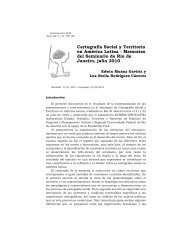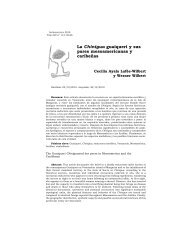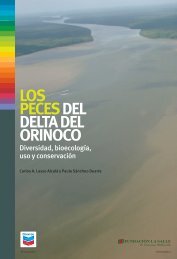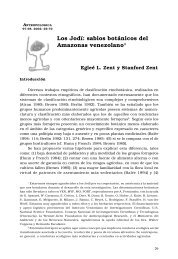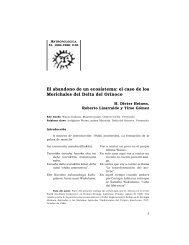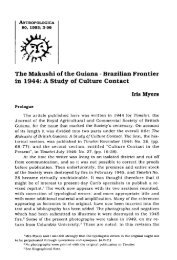War and a Semblance of Peace in the Inca Heartland
War and a Semblance of Peace in the Inca Heartland
War and a Semblance of Peace in the Inca Heartland
Create successful ePaper yourself
Turn your PDF publications into a flip-book with our unique Google optimized e-Paper software.
prisoners taken by <strong>the</strong> o<strong>the</strong>r capta<strong>in</strong>s were dressed <strong>in</strong> long shirts <strong>and</strong> <strong>the</strong>ir<br />
hair was treated as <strong>the</strong> hair <strong>of</strong> <strong>the</strong> o<strong>the</strong>r prisoners had been. The capta<strong>in</strong>s<br />
from <strong>the</strong> Andes had brought many wild lowl<strong>and</strong> animals, <strong>and</strong> Pachacuti<br />
ordered that <strong>the</strong>se be given noth<strong>in</strong>g to eat (Betanzos 1987, pt. 1, chps. 18-19:<br />
90-95).<br />
The next day, <strong>the</strong> entire army headed back to Cuzco. When <strong>the</strong>y were <strong>in</strong><br />
sight <strong>of</strong> <strong>the</strong> city, Pachacuti ordered <strong>the</strong> army to enter <strong>in</strong> a particular order.<br />
Each group was to s<strong>in</strong>g <strong>of</strong> <strong>the</strong> th<strong>in</strong>gs that had happened to it, beg<strong>in</strong>n<strong>in</strong>g with<br />
Pachacuti <strong>and</strong> <strong>the</strong> Soras prisoners <strong>and</strong> <strong>the</strong> song that had already been<br />
composed. The prisoners were ordered to enter <strong>the</strong> city cry<strong>in</strong>g <strong>and</strong> s<strong>in</strong>g<strong>in</strong>g <strong>of</strong><br />
<strong>the</strong>ir crimes <strong>in</strong> loud voices <strong>and</strong> <strong>of</strong> how <strong>the</strong>y were subjects <strong>and</strong> vassals <strong>of</strong> <strong>the</strong><br />
son <strong>of</strong> <strong>the</strong> Sun, <strong>and</strong> that <strong>the</strong>re were no forces strong enough to defeat him.<br />
The statue <strong>of</strong> <strong>the</strong> sun, <strong>the</strong> important huacas (sacred objects) <strong>and</strong> <strong>the</strong> bodies <strong>of</strong><br />
<strong>the</strong> <strong>Inca</strong> forebears had been assembled <strong>in</strong> <strong>the</strong> ma<strong>in</strong> plaza. Pachacuti had <strong>the</strong><br />
wild animals taken to <strong>the</strong> Cangaguase [Sangaguaci]. The prisoners were<br />
closed <strong>in</strong> with <strong>the</strong>m for three days, <strong>and</strong> if <strong>the</strong>y survived, <strong>the</strong>y were allowed to<br />
live but deprived <strong>of</strong> <strong>the</strong>ir estates <strong>and</strong> <strong>the</strong>ir positions <strong>and</strong> became servants <strong>of</strong><br />
<strong>the</strong> statues <strong>and</strong> huacas <strong>the</strong>re assembled. The <strong>in</strong>signias <strong>and</strong> arms <strong>and</strong> o<strong>the</strong>r<br />
th<strong>in</strong>gs taken <strong>in</strong> battle were placed <strong>in</strong> a house known as Llaxaguaci, where<br />
o<strong>the</strong>r such trophies <strong>of</strong> battle were to be kept <strong>the</strong>reafter. Then <strong>the</strong> people who<br />
had gone with Pachacuti were brought before him. They were richly rewarded<br />
<strong>and</strong> were also given <strong>the</strong>ir share <strong>of</strong> <strong>the</strong> spoils. Pachacuti <strong>the</strong>n named some <strong>of</strong><br />
<strong>the</strong>m to be lords (señores) <strong>of</strong> <strong>the</strong> prov<strong>in</strong>ces that had belonged to <strong>the</strong> enemies<br />
who had been eaten by <strong>the</strong> wild animals. Then it was time to rest (Betanzos<br />
1987, pt. 1, chp. 19: 95-97).<br />
Aga<strong>in</strong>, as <strong>in</strong> <strong>the</strong> campaign aga<strong>in</strong>st <strong>the</strong> Chancas <strong>and</strong> <strong>the</strong>ir allies <strong>in</strong><br />
Xaquixaguana, <strong>the</strong> emphasis is on ritual: both <strong>in</strong> connection with <strong>the</strong> march<br />
<strong>of</strong> <strong>Inca</strong> armies to war <strong>and</strong> with <strong>the</strong>ir victorious return. Practices related to <strong>the</strong><br />
treatment <strong>of</strong> prisoners <strong>and</strong> spoils, <strong>in</strong>clud<strong>in</strong>g <strong>the</strong> development <strong>of</strong> prisons <strong>and</strong><br />
museums for war trophies, may also be new. Pro<strong>of</strong> <strong>of</strong> capac status was richly<br />
celebrated, <strong>and</strong> even <strong>the</strong> prisoners were made to s<strong>in</strong>g <strong>the</strong>ir confirmation <strong>of</strong> it.<br />
Pachacuti’s later campaigns are not treated <strong>in</strong> <strong>the</strong> same detail <strong>in</strong><br />
Betanzos as this one. Pachacuti participated <strong>in</strong> a campaign aga<strong>in</strong>st <strong>the</strong> lord<br />
(señor) <strong>of</strong> Hatun Colla, who was call<strong>in</strong>g himself capac çapa apo <strong>in</strong>di chori,<br />
which Betanzos glosses as “k<strong>in</strong>g <strong>and</strong> only lord, son <strong>of</strong> <strong>the</strong> Sun”. Of course,<br />
this is <strong>the</strong> status that Pachacuti claimed (<strong>and</strong> that Uscovilca appears to have<br />
claimed before him). The description <strong>of</strong> Pachacuti’s preparations for <strong>the</strong><br />
campaign is brief; <strong>the</strong> battle is described <strong>in</strong> <strong>the</strong> same terms as <strong>the</strong> o<strong>the</strong>rs, that<br />
is, it was fiercely fought by both sides, <strong>and</strong> lasted from morn<strong>in</strong>g til late<br />
afternoon. The lord <strong>of</strong> Hatun Colla was captured <strong>and</strong> killed. Pachacuti ordered<br />
his head to be “prepared <strong>in</strong> such a way that it would not be damaged”, that is,<br />
preserved. The enemy dead were not to be <strong>in</strong>terred. Instead, <strong>the</strong>y were to be<br />
taken away from <strong>the</strong> battle site <strong>and</strong> left out <strong>in</strong> <strong>the</strong> open. On <strong>the</strong> site itself,<br />
207



